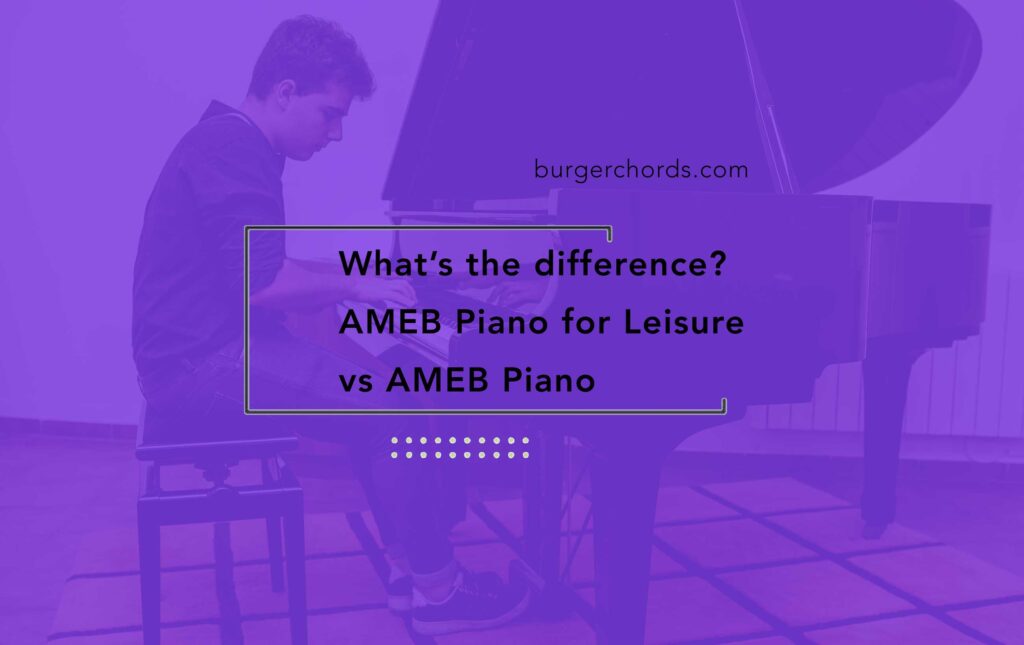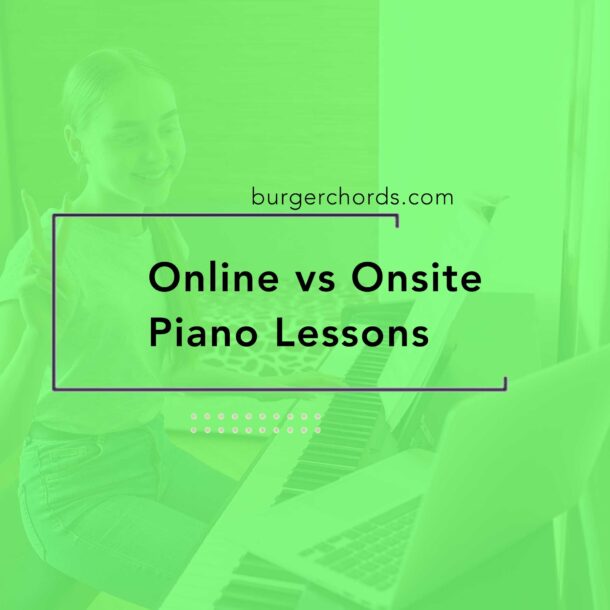

Which is the best piano exam to choose from in AMEB? The AMEB stands for the Australian Music Examination Board. With an exam center in each Australian state, they offer a variety of syllabus options. Here we’ll take a look at two of these options, “AMEB Piano for Leisure” versus the “AMEB Piano” syllabus.
In short, “AMEB Piano” has a focus on the ‘classical’ repertoire. That is Western (mostly European) piano music from the 17th-20th centuries. On the other hand, “AMEB Piano for Leisure” offers a mixed bag of popular songs that covers classical and contemporary music styles. This includes movie and TV soundtracks, pop songs, musical theatre, and more.
Both exam options are great for students who find a grade structure helpful to their progress. It’s also worth adding that it isn’t essential for students to sit AMEB or any piano-grade exams. In fact, all students should explore more than what AMEB grades require. Sure, an AMEB certificate is nice to hang on the wall, but music is much more than just playing the few songs needed for an exam.
AMEB “Piano” exams explained
AMEB Piano follows a more ‘traditional’ approach to Western piano music repertoire. Generally, songs are separated into 3-4 style “Lists”. They simply call these “List A”, “List B”, “List C” and “List D”.
Roughly speaking, List A pieces are usually a study or a piece written in the Baroque period (1600s), List B generally from the Classical era (1700s), List C from the Romantic period (1800s) and List D is 20th century to now. It’s important to note these refer to “style”, rather than strictly music written on those exact dates. For example, newer works that nod to earlier styles are listed in List A or B.
To prepare for the exam, students choose one song from each list to play for their exam. They also prepare a few “extra” songs which may or may not be performed in full.
Students sitting the “Piano” exams also have to perform scales, answer an aural component, do a sight-reading exercise, and demonstrate general knowledge of the pieces they performed. It’s usually these extra components, rather than performing the songs, that students find most intimidating.
AMEB “Piano for Leisure” explained
AMEB Piano for Leisure is, as the name suggests, a more “relaxed” version of the AMEB Piano exam. The syllabus scraps the rigid categories of “Lists” and students can choose any combination of pieces from the prescribed song list. Students can also include a “free choice” song, which can be their own composition or arrangement.
On top of the repertoire, students also have to prepare scales and general knowledge similar to the “Piano” exams. However, there are fewer scales to learn. Also notably, students can choose between aural tests or sight-reading, but don’t need to do both. This makes it much more feasible to regularly practice all the exam components in the limited time of a piano lesson.
With a much more diverse repertoire, Piano for Leisure offers a contemporary approach to piano learning. As such it’s very popular with young students.
Struggling to get your kids to practice their AMEB piano songs? Here’s why >
More AMEB piano exam modes
There are also more options within these two streams. Within both “AMEB Piano” and “AMEB Piano For Leisure”, students can choose a comprehensive exam, performance-only exam, “collaborative” exam, or video exam.
Limitations of AMEB exams
As mentioned at the start of this post, the AMEB syllabus should not be the sole learning tool for any student or teacher. Exam preparation, while important, should not consume 100% of a student’s time and should absolutely not be the core curriculum of any music school.
Why? One, it’s boring to repeat just a few songs over and over again. Repetition is needed to learn songs for a great performance, but variety is the spice of life! Students should have other small activities to do in conjunction or should learn a wide variety of songs before settling on the 3-5 pieces needed for their AMEB performance.
Two, the AMEB only represents one slice of music. Learning piano à la AMEB forms good skills, but it shouldn’t be the limit of music education. That’s because no exam board could ever represent the entire world’s music. Even if we narrow things down to our western tradition of music, the AMEB still only covers a chunk of what’s to offer. For example, it doesn’t delve far into areas like composition, orchestration, improvisation, sound production, jazz theory, music criticism, electronic music, and so on. Nor should it. IMHO, it covers what it does—musicianship, repertoire, performance, aural skills, sight-reading, and general music knowledge—in a useful way. But there’s no reason to limit students to only learning music skills to pass AMEB exams.
Ready to try a piano lesson?
Which AMEB Piano exam should I choose?
Honestly, either is great! The AMEB standard is nationally and internationally recognised. Furthermore, students can swap from “Piano for Leisure” to “Piano”, or vice versa if they so wished.
In my opinion, the best way to choose which piano exam is to see which songlist appeals most to the student. Since these pieces will be played over and over and over again, enjoyment is essential! It’s easy to suss out the songlist: simply go on YouTube or Spotify and find the AMEB playlist.
Also, choosing neither option is fine too. There’s nothing wrong with learning the graded syllabus but skipping the exam. Exams aren’t for everyone and I find that students do best when they opt-in themselves. Surprisingly, making the exam voluntary doesn’t spell an automatic “no” from kids. On the contrary, I have many students request to sit the exams themselves!

About the piano teacher
Michelle is a freelance pianist and piano teacher who aspires to make music fun and accessible for anyone who wants to play. She’s been playing and teaching piano to kids and adults for over a decade, and brings good vibes playing piano for weddings and events at Michelle Plays Piano.
Michelle also plays drums in post-punk and indie bands around Melbourne, and has written about bands for The Music and EARMILK. When she’s not obsessing over music, she’s probably thinking about food.




1 Comment
Hi Michelle ,
I need some guidance on choosing the Piano exam and advice , can i please connect with you.
Regards,
Ram